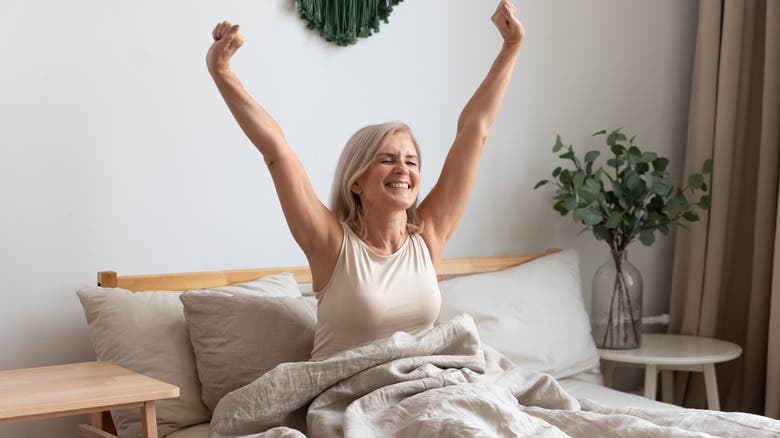Breakthrough research uncovers why adults wake up earlier as they get older
A closer inspection reveals the intriguing interplay of genetics, aging, and our body’s response to the environment.

[Sept. 5, 2023: Staff Writer, The Brighter Side of News]
Aging brings inevitable changes, both within and outside the body. (CREDIT: Creative Commons)
The joke about seniors waking up at the crack of dawn while their teenage grandchildren sprawl in bed till noon is all too common in western society. This generational rift in sleep patterns, often dismissed as a mere stereotype, is rooted in science. A closer inspection reveals the intriguing interplay of genetics, aging, and our body’s response to the environment.
Aging brings inevitable changes, both within and outside the body. As Cindy Lustig, a professor of psychology at the University of Michigan, put it, “Like most of the things that change with age, there’s not just one reason, and they are all interconnected.”
Unpacking these intertwined reasons and offering solutions for a good night's sleep was our endeavor, which led us to consult Lustig and other prominent sleep experts.
Aging Brain and its Reduced Responsiveness
The natural aging process, undoubtedly, affects our wake times. As we age, our brain, like other parts of our body, becomes less nimble. Dr. Sairam Parthasarathy, who heads the Center for Sleep and Circadian Sciences at the University of Arizona Health Sciences, elaborated, “The wiring of the brain is likely not sensing ... and responding to the inputs as well as it should because it’s an aging brain.”
These “inputs” range from environmental cues such as sunset and sunlight to physiological factors like meals, physical activity, and even social interactions. Dubbed as "time givers" by Parthasarathy, these cues help the brain map its position in the 24-hour circadian cycle.
Related Stories
But the twist comes with age. While a dinner bell might act as a signal for bedtime in a few hours for youngsters, an older individual might not draw the same inference. This miscommunication can be attributed to the nerves responsible for transmitting these time cues.
"The nerves that are supposed to give the brain time cues have undergone the same amount of degeneration as the brain," Parthasarathy commented. This makes elders more prone to feeling tired earlier and consequently waking up ahead of their younger counterparts.
The Crucial Role of Vision
Lustig shed light on another intriguing facet. “Interestingly, one of [the reasons] seems to be that the vision changes that come with age reduce the intensity of the degree of light stimulation that our brain receives,” she explained. This light stimulation is vital for synchronizing our internal circadian clock.
The amount of light your eyes take in each evening impacts when you're ready to go to sleep. (CREDIT: LWA/Dann Tardif via Getty Images)
Supporting this, Parthasarathy emphasized the particular impact on individuals suffering from cataracts, a condition affecting more than half of the American populace aged 80 or older, as per data from the National Institutes of Health. Cataracts often cause blurred or double vision. “If there’s cataracts, the evening light doesn’t go into the eyes as much, so, according to the brain, sunset is earlier than when it actually set,” he stated.
The ramifications? Reduced light leads to the premature release of melatonin, our body’s sleep hormone. Younger folks start producing melatonin post-sunset, aligning with the time they feel drowsy. However, for those with cataracts, the perceived sunset and hence melatonin release is advanced, causing them to tire early. The corollary being, early to bed, early to rise.
There's a reason why older people tend to wake up earlier in the mornings — it's a part of the natural aging process. (CREDIT: Willie B. Thomas via Getty Images)
Encouragingly, Lustig mentioned, “There is some evidence that cataract removal surgery can help improve sleep quality and duration by helping those light cues get through.”
Bright Lights and Better Sleep
For those grappling with altered sleep patterns, Parthasarathy recommends a surprising remedy. Contrary to the popular advice of avoiding screens, he suggests embracing them. "Expose yourself to bright light in the late evening," he advises. Activities like evening walks, using bright devices, or even installing artificial lights can be beneficial.
Younger folks start producing melatonin post-sunset, aligning with the time they feel drowsy. (CREDIT: Creative Comons)
Such luminous cues can delay melatonin production. To shift bedtime, he prescribes exposure to bright light 30 to 60 minutes before sunset. The recommended duration? Approximately two hours, extending post-sunset.
Backing this, Lustig advocates for avoiding alcohol pre-sleep. “While that nightcap might make you sleepy, it actually disrupts the quality of your sleep.” Furthermore, incorporating exercise and exposure to morning sunlight can assist in realigning our body's clock with the sun.
Modifications in sleep routines are an inescapable part of life's journey. While some elements might be beyond our command, integrating positive habits can help in securing sound sleep. In the quest for restful slumber, understanding these aging-related changes can be the key. After all, knowledge is the first step toward addressing any challenge.
Note: Materials provided above by The Brighter Side of News. Content may be edited for style and length.
Like these kind of feel good stories? Get the Brighter Side of News' newsletter.



